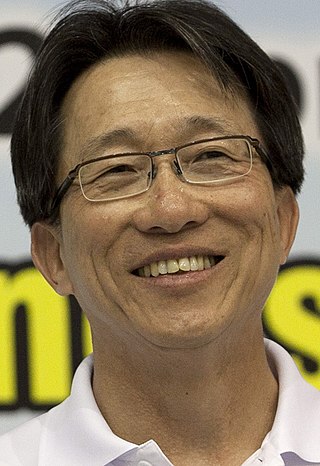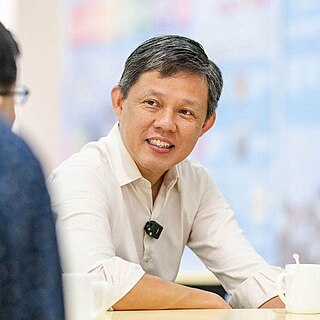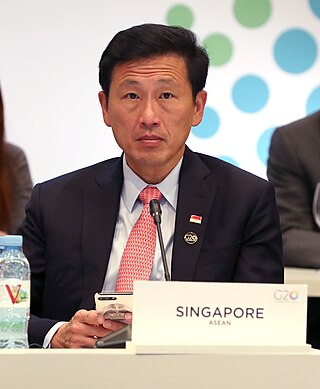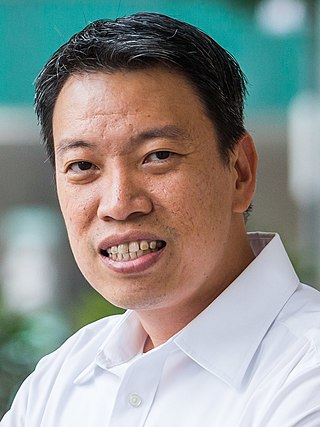A minimum wage is the lowest remuneration that employers can legally pay their employees—the price floor below which employees may not sell their labor. Most countries had introduced minimum wage legislation by the end of the 20th century. Because minimum wages increase the cost of labor, companies often try to avoid minimum wage laws by using gig workers, by moving labor to locations with lower or nonexistent minimum wages, or by automating job functions. Minimum wage policies can vary significantly between countries or even within a country, with different regions, sectors, or age groups having their own minimum wage rates. These variations are often influenced by factors such as the cost of living, regional economic conditions, and industry-specific factors.

The National Trades Union Congress (NTUC), also known as the Singapore National Trades Union Congress (SNTUC) internationally, is the sole national trade union centre in Singapore. NTUC is at the heart of the labour movement of Singapore, comprising 59 affiliated trade unions, 5 affiliated trade associations, 10 social enterprises, 6 related organisations and other enterprise partners. It helms May Day celebrations and organises an annual rally in support of workers' solidarity and commitment to tripartite partnership. The NTUC has had a symbiotic relationship with the People's Action Party (PAP) since its inception in 1961.

Lim Swee Say is a Singaporean former politician who served as Secretary-General of the National Trades Union Congress between 2005 and 2015, Minister for Manpower between 2015 and 2018, Minister in the Prime Minister's Office between 2004 and 2015, Second Minister for National Development between 2004 and 2005, and Minister for the Environment between 2000 and 2004.
The Dual Sector model, or the Lewis model, is a model in developmental economics that explains the growth of a developing economy in terms of a labour transition between two sectors, the subsistence or traditional agricultural sector and the capitalist or modern industrial sector.

Lim Boon Heng is a Singaporean former politician. A former member of the governing People's Action Party (PAP), he was a Member of Parliament (MP) between 1980 and 2011, and had served in the Cabinet between 2001 and 2011. He also served as Chairman of the People's Action Party between 2004 and 2011.
Goods and Services Tax (GST) in Singapore is a value added tax (VAT) of 9% levied on import of goods, as well as most supplies of goods and services. Exemptions are given for the sales and leases of residential properties, importation and local supply of investment precious metals and most financial services. Export of goods and international services are zero-rated. GST is also absorbed by the government for public healthcare services, such as at public hospitals and polyclinics.

Josephine Teo Li Min is a Singaporean politician who has been serving as Minister for Communications and Information, and Second Minister for Home Affairs since 2017. She is also serving as Minister-in-charge of the Cyber Security Agency and Smart Nation Initiative since 2021. A member of the governing People's Action Party (PAP), she has been the Member of Parliament (MP) representing the Kreta Ayer–Kim Seng division of Jalan Besar GRC since 2020.
The National Day Rally is an annual message delivered by the Prime Minister of Singapore to the entire nation, on the first or second Sunday after National Day on 9 August. Started in 1966, the national day rally is Singapore's equivalent of the President of the United States’s State of the Union address. The prime minister uses the rally to review the country’s status, its key challenges, as well as to set the country's direction, major policy changes, the economy, future plans and achievements. Also, the prime minister only does the rally speech In English, Chinese and Malay, not in Tamil.

Chan Chun Sing is a Singaporean politician and former major-general who has been serving as Minister for Education since 2021 and Minister-in-charge of Public Service since 2018. A member of the governing People's Action Party (PAP), he has been the Member of Parliament (MP) representing the Buona Vista division of Tanjong Pagar GRC since 2011.
Income Insurance Limited, commonly known as Income, is a composite insurer based in Singapore, offering life, health and general insurance.

Ong Ye Kung is a Singaporean politician and former civil servant who has been serving as Minister for Health since 2021. A member of the governing People's Action Party (PAP), he has been the Member of Parliament (MP) representing the Sembawang Central division of Sembawang GRC since 2015.
The Labor policy in the Philippines is specified mainly by the country's Labor Code of the Philippines and through other labor laws. They cover 38 million Filipinos who belong to the labor force and to some extent, as well as overseas workers. They aim to address Filipino workers’ legal rights and their limitations with regard to the hiring process, working conditions, benefits, policymaking on labor within the company, activities, and relations with employees.
Koh Poh Koon is a Singaporean politician and former colorectal surgeon who has been serving as Senior Minister of State for Sustainability and the Environment since 2022 and Senior Minister of State for Manpower since 2021. A member of the governing People's Action Party (PAP), he has been the Member of Parliament (MP) representing the Tampines Central division of Tampines GRC since 2020.
The National Trades Union Congress (NTUC) spearheads the labour movement of Singapore, which represents almost a million workers in the country across more than 70 unions, affiliated associations and related organisations. Singapore runs on a tripartism model which aims to offers competitive advantages for the country by promoting economic competitiveness, harmonious government-labour-management relations and the overall progress of the nation.
In Singapore, May Day is celebrated on 1 May each year as a mark of solidarity amongst workers. The celebration of May Day as a public holiday began only in 1960 after the People's Action Party (PAP) came into power. Before then, only workers defined as such under the Labour Ordinance 1955 and those defined as industrial clerks under the Clerks Employment Ordinance 1957 were given paid holidays.

Zainal bin Sapari is a Singaporean former politician. A member of the governing People's Action Party (PAP), he was the Member of Parliament (MP) representing the Pasir Ris East division of Pasir Ris–Punggol GRC between 2011 and 2020.

The Silver Support Scheme Act 2015 is a statute of the Parliament of Singapore that implements the social security Silver Support Scheme in Singapore. The law supplements the retirement savings of the needy elderly, to help them cope with their living expenses.

Melvin Yong Yik Chye is a Singaporean politician, union leader and former police officer. A member of the governing People's Action Party (PAP), he has been the Member of Parliament (MP) representing Radin Mas SMC since 2020 and previously the Moulmein–Cairnhill division of Tanjong Pagar GRC between 2015 and 2020.
K. Thanaletchimi is a Singaporean labour unionist and was a Nominated Member of Parliament of Singapore from 24 March 2016 to 21 September 2018.
The following lists events that happened during 2021 in the Republic of Singapore.









